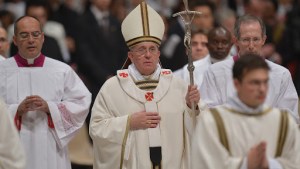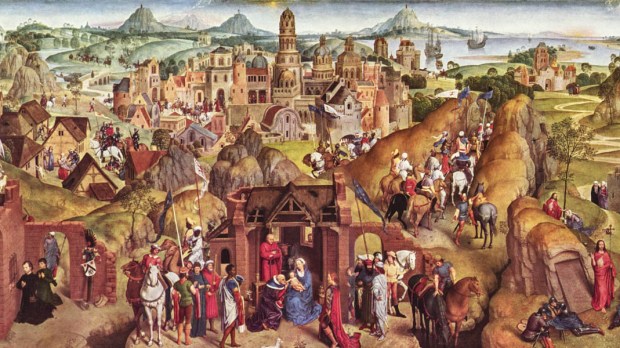You know Advent has four weeks, right? Well, sort of. It always has four Sundays, and the last week—usually only partial—varies in length. It depends on when Advent begins: anywhere from November 27 to December 3.
A little history
One of the oldest records of Advent is found in St. Gregory of Tours’ History of the Franks. Gregory reports that St. Perpetuus, around the year 480, decreed a preparation for Christmas extending from the feast of St. Martin (November 11) until Christmas. This period of 43 days came to be called “St. Martin’s Lent,” in imitation of the Lenten preparation for Easter.
Later, a local church council in Tours, France, in 567, instituted an Advent of 24 days, from December 1 to December 24. It wasn’t until the 9th century that Pope St. Nicholas I apparently established the timeframe that we still use for Advent: four Sundays, with the first being the Sunday closest to St. Andrew’s Day (November 30); and a length of 22 to 28 days.
The comings of Christ
There’s a deep mystical meaning to the structure of Advent. The word “advent” is originally a Latin word meaning “coming.” The purpose of Advent, then, is to prepare for the coming of Christ.
The French liturgical expert, Dom Gueranger, points out that “the new birth of our Redeemer takes place after four weeks, as the first nativity happened after four thousand years,” according to the chronology in the Old Testament.
We are invited in Advent to unite spiritually with the Old Testament believers who awaited the coming of the Messiah over the course of roughly 4,000 years.
Jacobus de Voragine, in The Golden Legend, records another medieval interpretation: “Advent is celebrated for four weeks, to signify that this coming of the Lord is fourfold.”
He says that Jesus comes …
- “in the flesh,” when He was born of Mary in Bethlehem
- “into our hearts,” when we become members of His Church by Baptism, and are united with Him by grace
- “in death,” when each of us is called individually to appear before Him
- “at the Last Judgment,” when He will return again in glory, “to judge the living and the dead”
Preparing for the four comings
The Church, in the Gospel readings she assigns for each of the four Sundays of Advent, is preparing us for each of these four comings.
— The First Sunday of Advent focuses on the coming of Christ at the Last Judgment. In this year’s Gospel (Luke 21:25-28, 34-36), we are reminded of the signs that will precede this coming, and warned that “that day will assault everyone who lives on the face of the earth.”

Read more:
Pope: Our meeting with Jesus will be full of mercy, but let’s prepare
— The Gospel for the Second Sunday (Luke 3:1-6), shows us John the Baptist “proclaiming a baptism of repentance.” The Church is here preparing us for the coming of Christ in death.
— The Gospel of the Third Sunday (Luke 3:10-18) continues that of the Second Sunday. Here John gives counsel when people ask him, “What should we do?” John the Baptist is brought forth to prepare us, too, for the coming of Christ into our hearts.
— In the final Sunday of Advent, the Gospel reading is the story of the Visitation (Luke 1:39-45). The coming of Christ in history is near; and the Church shows us Mary as the model of one who “believed that what was spoken by the Lord would be fulfilled.” Mary was the first Bethlehem, for it was into her womb that Christ first came.
St. Bernard of Clairvaux teaches that these comings are mystically linked together. The Son of God united Himself to our human nature in history, so that He might unite us to Himself by coming into our hearts, and in this way prepare us to stand before Him in death and in the Last Judgment, so that we might share His glory in heaven forever.

Read more:
10 Things you’ll regret not doing with your kids

